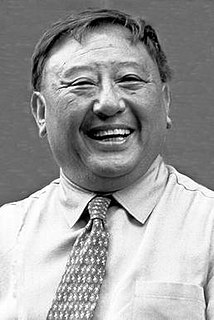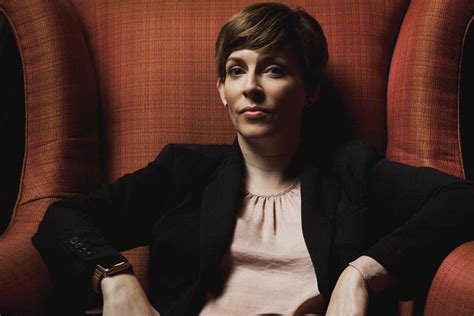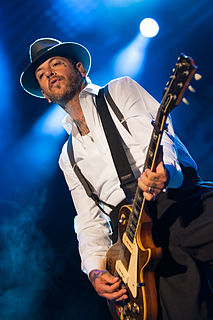A Quote by Eckhart Tolle
The ego tends to equate having with Being: I have, therefore I am. And the more I have, the more I am. The ego lives through comparison. How you are seen by others turns into how you see yourself.
Related Quotes
"Understand the process of the ego. How does the ego live? The ego lives in the tension between what you are and what you want to be. A wants to be B - the ego is created out of this very tension. How does the ego die? The ego dies by you accepting what you are. That you say, "I am fine as I am, where I am is good. I will remain just as existence keeps me. Its will is my will."
The ego isn't wrong; it's just unconscious. When you observe the ego in yourself, you are beginning to go beyond it. Don't take the ego too seriously. When you detect egoic behavior in yourself, smile. At times you may even laugh. How could humanity have been taken in by this for so long? Above all, know that the ego isn't personal. It isn't who you are. If you consider the ego to be your personal problem, that's just more ego.
'I am' is nothing but another name for the ego. Now you will be getting into trouble. If the ego is convinced that the only way is to drop the ego, then who is going to drop whom? And how? It will be like pulling yourself up by your own shoestrings. You will look just silly. Watch each word that you use. 'I am' is nothing but the ego.
"When you accept your life - when you take your breakfast, and when you sleep and when you walk and when you take your bath - how can you create an ego out of these things? Sleeping when feeling sleepy, eating when feeling hungry, how can you create your ego? No, if you fast, you can create ego. If you are on a vigilance for the whole night, and you say, "I am not going to sleep," you can create the ego. By the morning, the person who has slept well will have no ego, you will have a great ego."
Ego is neither positive nor negative. Those are simply concepts that create more boundaries. Ego is just ego, and the disaster of it all is that you, as a spiritual seeker, have been conditioned to think of the ego as bad, as an enemy, as something to be destroyed. This simply strengthens the ego. In fact, such conclusions arise from the ego itself. Pay no attention to them. Don't go to war with yourself; simply inquire into who you are.
There is another side [to ego] that can wreck a team or an organization. That is being distracted by your own importance. It can come from your insecurity in working with others. It can be the need to draw attention to yourself in the public arena. It can be a feeling that others are a threat to your own territory. These are all negative manifestations of ego, and if you are not alert to them, you get diverted and your work becomes diffused. Ego in these cases makes people insensitive to how they work with others and it ends up interfering with the real goal of any group efforts.
Charisma seems to be more about the intoxicating quality that you have on other people, as opposed to presence, which is more about the self in relation to others, and how you feel you represented yourself in a situation, and how you were able to engage. So it's less about how others see you and more about how you see yourself.
The more successful you become, the more the demands of your ego will increase. In the beginning, you simply want to succeed, but your ego will not be satisfied. When you become a little more successful your ego wants to kill your competition. And when you become even more successful, it wants to make you the universal king. There's no telling what ego wants because our desire doesn't have any limit; therefore, its demands continually increase.
The child is born with a Self but not with an ego. The child develops the ego. As he becomes more and more social and related, ego develops. This ego is just on your periphery where you are related with others - just on the boundary of your being. So ego is the periphery of your being, and Self is the center. The child is born with a Self, but unaware. He is a Self, but he is not conscious of the Self.
That is again the same story played on a more subtle level. That's what the religious people have been doing down the ages - pious egoists they have been. They have made their ego even more decorated; it has taken the color of religion and holiness. Your ego is better than the ego of a saint; your ego is better, far better - because your ego is very gross, and the gross ego can be understood and dropped more easily than the subtle. The subtle ego goes on playing such games that it is very difficult. One will need absolute awareness to watch it.
I've found in my own life that the older I get, the more stubborn I am in my beliefs and opinions. Without keeping my ego in check, it would be easy for me to bail on relationships when I didn't agree with someone. The antidote to this problem is humility, plain and simple. The more we claim an unassuming nature, the more we believe the best about people and situations, and the more we try and see others through the lens of love. We are then given the opportunity for our relationships to grow.
I find my own pain and others' difficult to tolerate, so I always want to try to shift things so they'll be better. But in doing that, if I am coming from a place of ego, I often cause harm. So it's a struggle for me to set my ego outside and find a softer and more compassionate way of approaching things.




























